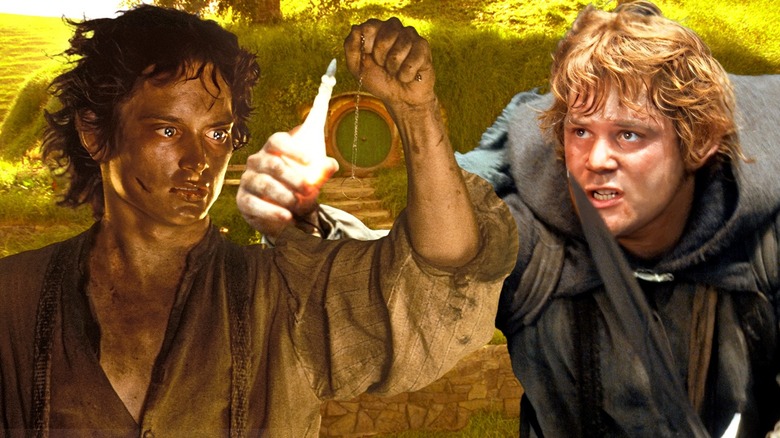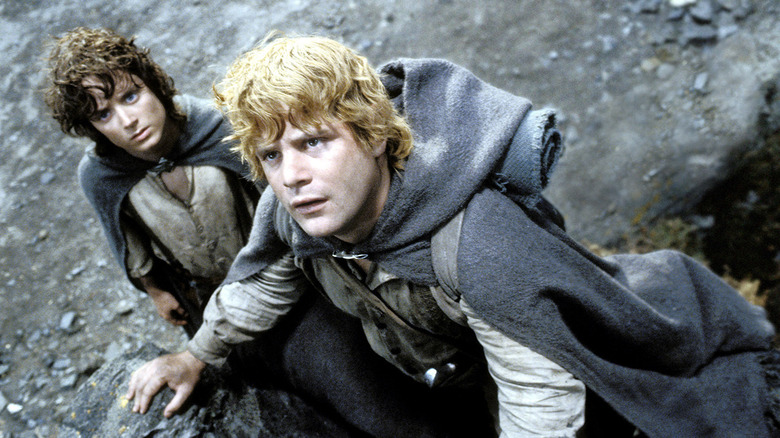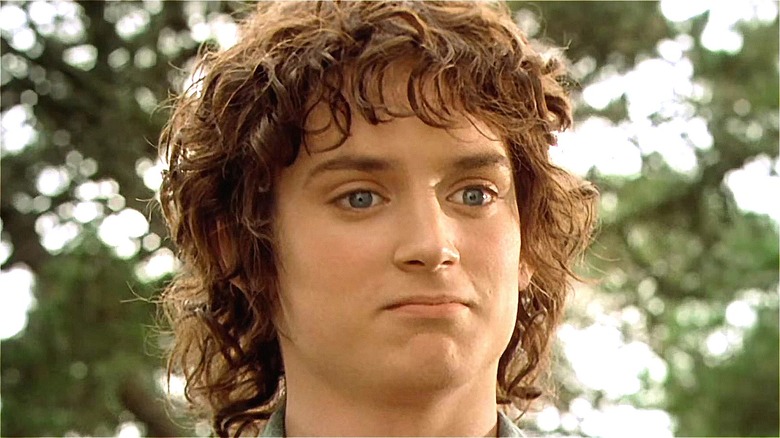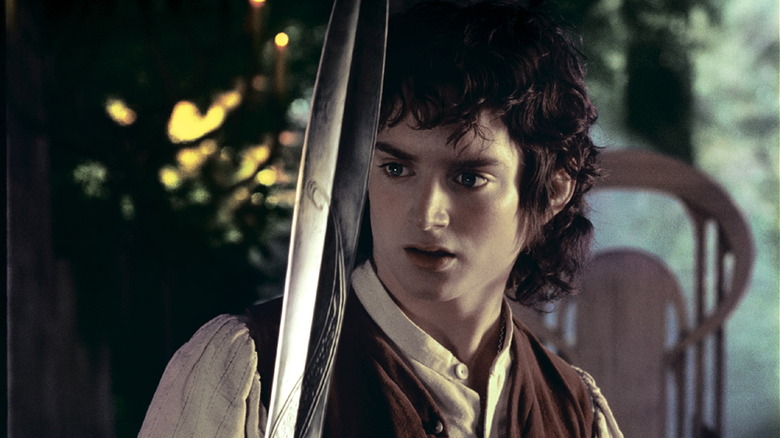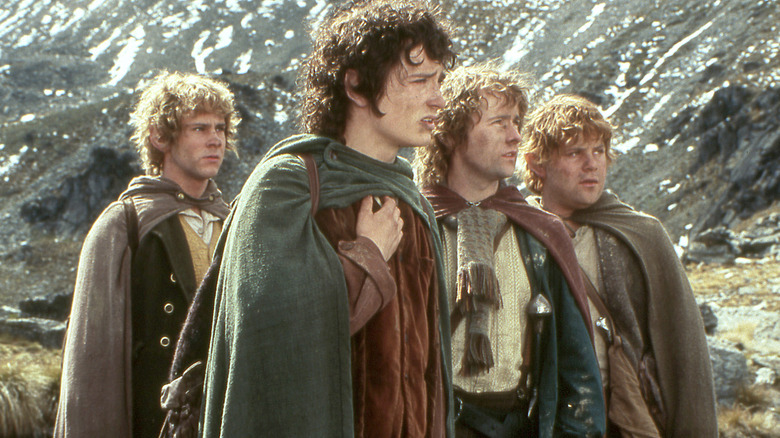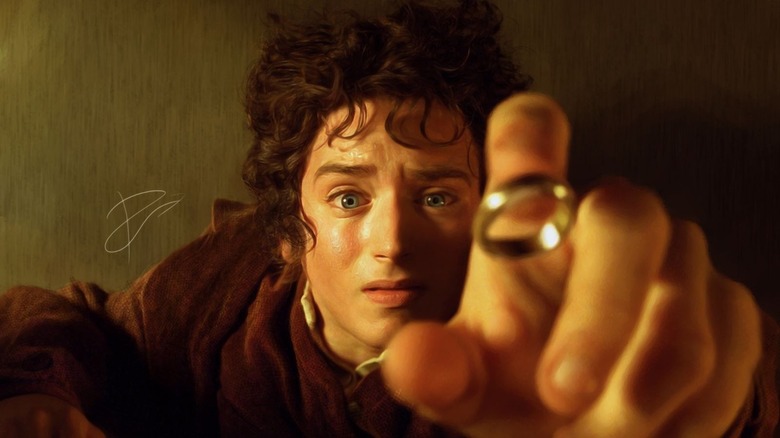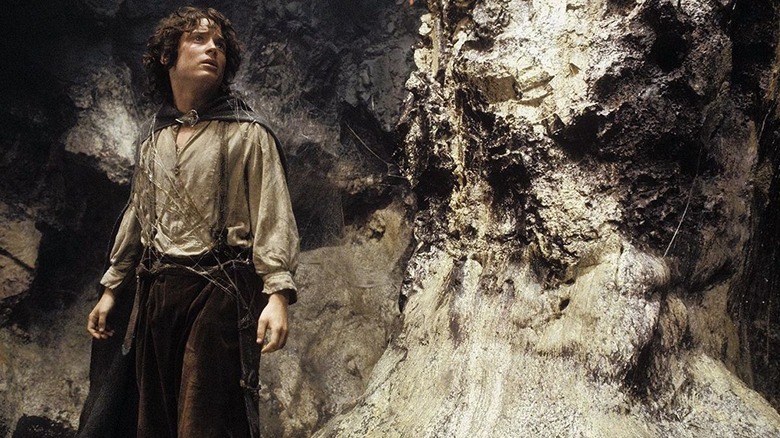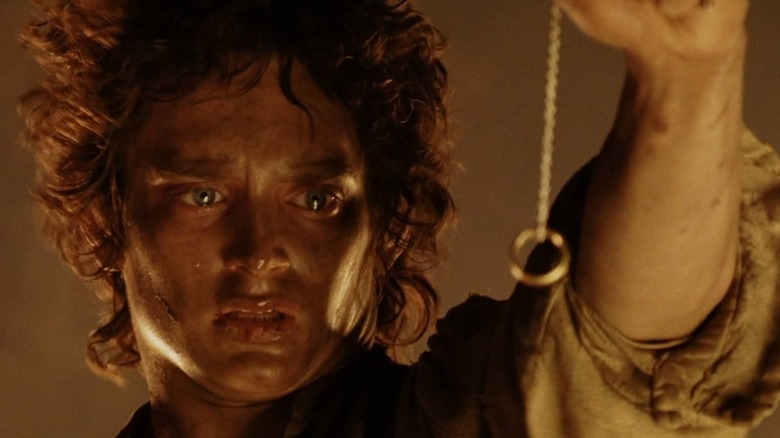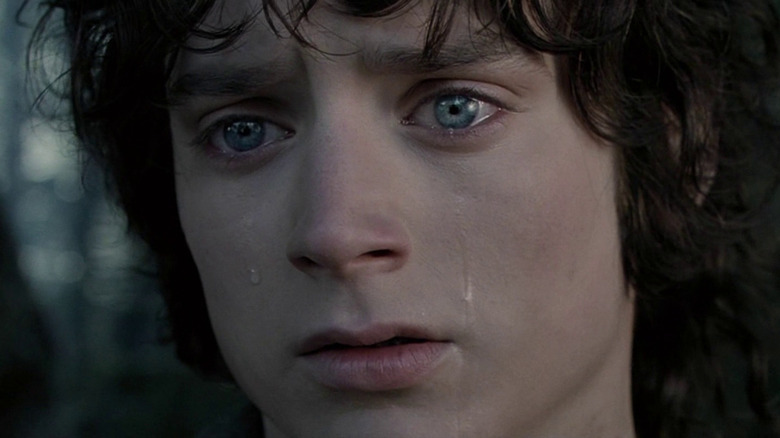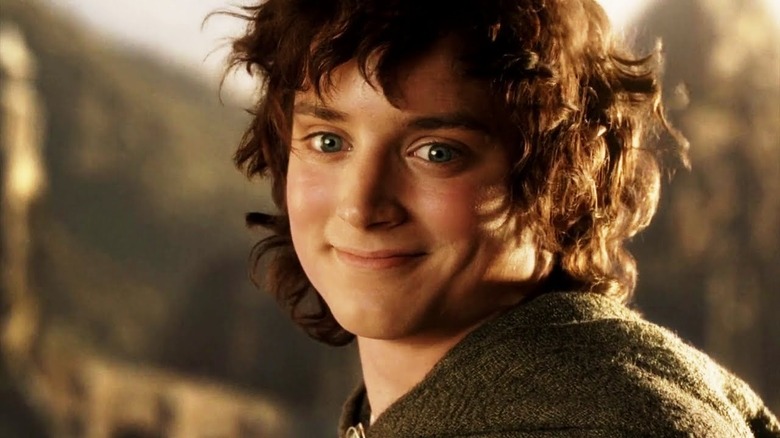Frodo Is The Greatest Hero Of LOTR (Even If Tolkien Picked Samwise)
There are a lot of heroes in "The Lord of the Rings." From valiant warriors of Rohan, like Éomer and Éowyn, to stalwart Elvish opponents of Sauron, like Galadriel and Elrond, plenty of characters fit the bill of lion-hearted protagonists fighting the good fight. The greatest concentration of individuals worthy of the hero moniker assembles in the form of the Fellowship of the Ring. This unlikely alliance of an Elf, a Dwarf, two Men, four Hobbits, and one Wizard works together to execute one of the most important quests in the history of Middle-earth.
When discussing heroism, though — even within the rank and file of this beloved posse — there are some characters who stand out as more heroic than others. Aragorn is a central figure who oozes heroism. Gandalf is an overpowered advocate for good that refuses to fall to the temptation of power. And then, there's Samwise Gamgee and Frodo Baggins. Sam is arguably the most important hero in the entire story (if only because Tolkien himself referred to him as the "chief hero" — more on that in a minute). But Frodo is also clearly a front-runner for the top-ranked champion. In fact, when you break it down, there's a serious case to be made that Frodo is among the most accomplished heroes of the entire story. We even think it isn't going too far to state that Frodo is the greatest hero of "The Lord of the Rings" trilogy (even if Tolkien technically picked Samwise).
Now, before you start writing angsty letters quoting passages or making an elaborate defense of everyone's favorite Hobbit gardener (who is admittedly one of the most awesome characters ever created) ... please, allow us to explain.
Yes, Sam is the chief hero of The Lord of the Rings
Let's start with the obvious: Tolkien himself saw Samwise Gamgee as the primary hero of the story. Where does this claim come from? Why, from the pen of the author himself, of course. In a very lengthy letter to a publisher, which is undated but likely written in late 1951, Tolkien talks at length about his then-unpublished, though close to finished, story. In the description, he brings up Sam's story arc and mentions in passing, "I think the simple 'rustic' love of Sam and his Rosie (nowhere elaborated) is absolutely essential to the study of his (the chief hero's) character, and to the theme of the relation of ordinary life (breathing, eating, working, begetting) and quests, sacrifice, causes, and the 'longing for Elves', and sheer beauty."
It's this passing reference to Sam as "the chief hero" that has caused pro-Sam adherents (who are legion within the fandom) to put him forward as the primary hero. And don't get us wrong. Taken at face value, it does appear that Tolkien is referring to Sam as the primary protagonist of his world — and with good reason, too. Much of the story is told from his perspective. He also does a ridiculous number of important things, any one of which could be considered pivotal to the success of the quest to destroy the One Ring.
Sam is a faithful presence by Frodo's side from day one. He cares for his master's every need (which proves to be just enough to get him to the Cracks of Doom). He watches the treacherous Gollum. He fends off the hideous Shelob. Heck, he carries Frodo up Mount Doom. Sam is an essential hero in the story. No one is arguing that fact.
Frodo Baggins isn't a stand-out hero ...at first glance
Set against the heroic Sam, we have Frodo Baggins. Mr. Baggins is a primary candidate for the top hero spot if only because he's the Ring-bearer. He also has a little more flare than his gardener. He's from an important family and has some wealth and valuable connections. But the low-hanging arguments for Frodo's candidacy for "the greatest hero" stop there.
When you peel back the curtain a bit, there actually isn't much about Frodo's character arc that screams "incredible champion" or "savior of the world." On the contrary, from start to finish, Frodo shows plenty of flaws that undermine his campaign for the title of the greatest. Take his Ring-bearer status, as a perfect example. Sure, he carries the number one most powerful bauble in all of Middle-earth, but he didn't even win that treasure himself. His cousin Bilbo did. Frodo just inherited the darn thing.
Things don't get better as you go along, either. Once Frodo stumbles into his adventure, he needs a lot of help along the way from warriors, counselors, and his fellow Hobbits. And when he gets to the end of his quest? Yeah, even then, he can't even stick the landing. Sam has to carry him up to the Cracks of Doom, and Gollum has to literally bite off his finger and trip into the fiery depths for the story to have a happy ending.
It's also worth pointing out that Frodo's task is dull, exhausting, and introspective. That means when Elijah Wood had to act it out on the screen, it was anything but easy. As the weight of the Ring gets heavier, the actor tends to look more melancholic and self-absorbed, none of which exudes heroic qualities.
So, how is Frodo the hero of Lord of the Rings, then?
Okay, now that we've built Sam up and done the dirty work of tearing Frodo down, let's consider how we can even start to think about bestowing on Mr. Baggins the title of "greatest hero." Let's begin with the semantics. Technically, Sam is the "chief hero." Yes, that's true. But Tolkien only mentioned it in passing. It wasn't an absolute categorization. In context, "chief" seems to be referring to the primary hero of the story rather than indicating any sense of inherent superiority over other candidates.
We aren't saying Frodo is the primary hero. That's hogwash. A huge part of the story is told from Sam's point of view. What we're claiming is that, when you add it all up, Frodo is the "greatest" hero and a more epic, accomplished protagonist than his faithful servant.
Sam comparisons aside, consider how Frodo's greatness compares to everyone else. Gandalf is a Wizard that defeats a balrog and quite literally rallies the entire free world to defeat the Dark Lord. Aragorn is every ounce of what you'd expect a traditional hero to be. How is Frodo better than them?
It's the Hobbit's spiritual journey that really helps him stand out here. The unseen trials and tribulations Frodo goes through aren't clear in the movies, but they're pretty obvious in the source material. Even then, those struggles are so overwhelming that even Tolkien couldn't put them into words easily. He resorts to Sam's point of view throughout Frodo and Sam's journey, only occasionally hinting at Frodo's larger, indescribable struggle. That said, there are still plenty of glimpses of that inner battle along the way, and they provide a window into just how heroic Frodo is under that unassuming Halfling surface.
Nobody's story is as epic as Frodo's journey in the Lord of the Rings
Let's take a quick stroll through the "Lord of the Rings" story with an emphasis on Frodo's burdened and deteriorating spiritual condition throughout the tale. One of the first times we really see Frodo spiritually engaged in the movies is when he puts on the One Ring at the Prancing Pony in Bree. In the books, it isn't until Weathertop that he gets his first full dose of otherworldly horror in the form of his Nazgûl attackers.
At the Council of Elrond, Frodo is still very much the reluctant hero. In "The Fellowship of the Ring" book, it explains that just before he announces that he will take the Ring to Mordor, "An overwhelming longing to rest and remain at peace by Bilbo's side in Rivendell filled all his heart. At last with an effort he spoke, and wondered to hear his own words, as if some other will was using his small voice." This reluctance is important. It shows that, against every fiber of his being, Frodo is still willing to sacrifice himself for the greater good. Sam may be sold out to protecting Frodo, but his master has the entire world in mind.
When the Fellowship of the Ring leaves Rivendell, Elrond piles the responsibility on, clarifying that any member of the group can leave at any time ...except Frodo, "The Ring-bearer is setting out on the Quest of Mount Doom. On him alone is any charge laid: neither to cast away the Ring, nor to deliver it to any servant of the Enemy nor indeed to let any handle it, save members of the Company and the Council, and only then in gravest need." With this unsettling charge laid on him, Frodo sets out on his improbable and irrevocable rescue mission.
Frodo is crushed by the weight of the Ring
Initially, Frodo comes across as a reluctant hero. He's the conduit through which others push forward the destruction of the Ring. Even early on, though, it's clear that Frodo is doing something mighty just by keeping the overpowered bauble in his possession. In "The Fellowship of the Ring" book, Frodo offers Gandalf the Ring, and the Wizard dramatically refuses. He tells Frodo not to tempt him, adding that the Ring would gain great and deadly power over him. This puts Frodo's lengthy possession of the Ring (and its potential effect on him) in context.
Once he reaches and then enters Mordor, things get worse, and Sam notices. In "The Return of the King," as the pair of Hobbits approach Mount Doom, the stouthearted gardener notes that "Frodo had not spoken, but had walked half-bowed, often stumbling, as if his eyes no longer saw the way before his feet. Sam guessed that among all their pains he bore the worst, the growing weight of the Ring, a burden on the body and a torment to his mind." The text adds that "Anxiously Sam had noted how his master's left hand would often be raised as if to ward off a blow, or to screen his shrinking eyes from a dreadful Eye that sought to look in them. And sometimes his right hand would creep to his breast, clutching, and then slowly, as the will recovered mastery, it would be withdrawn."
When Sam does wear the Ring for a brief stint at the Tower of Cirith Ungol, he gets a quick taste of this horrible burden. That said, in the grand scheme of things, this is nothing compared to Frodo's ongoing and heartbreaking afflictions.
In The Lord of the Rings, Frodo loses himself
In "The Return of the King" book, at one point toward the end, Sam asks Frodo if he remembers the herbs and stewed rabbit they ate just before they ran into Faramir and his men. Frodo's response is that he doesn't. He knows that these events happened, but he can't picture them in his mind. He adds the heart-wrenching line, "No taste of food, no feel of water, no sound of wind, no memory of tree or grass or flower, no image of moon or star are left to me. I am naked in the dark, Sam, and there is no veil between me and the wheel of fire. I begin to see it even with my waking eyes, and all else fades."
Sam heroically helps, in every way that he can. He gets rid of unnecessary items to lighten their load and even helps Frodo by holding his wayward hands so that they don't grab the Ring involuntarily. Eventually, at the climax of his heroism, Sam carries Frodo up the slopes of Mount Doom one painful step at a time. But the text clarifies that even then, he doesn't feel the tremendous burden of the Ring. His simple and heroic spirit is spared that devastating experience. Throughout the ordeal, the otherworldly weight of Sauron's power in his Ring is Frodo's trial to bear, and Frodo's alone.
Frodo could never have destroyed the Ring by himself
As far as the "Frodo didn't even destroy the Ring" argument is concerned, this isn't a surprise, nor is it a knock on his heroics. Once again, quoting from "The Return of the King" book, at one point, Sam asks if he can carry the Ring for a bit to help. Frodo frantically rejects the idea, then calms down and says, "It is my burden, and no one else can bear it. It is too late now, Sam dear. You can't help me in that way again. I am almost in its power now. I could not give it up, and if you tried to take it I should go mad."
This inability to surrender the Ring echoes back to the beginning of the story when Frodo panics because Gandalf throws the Ring into his little living room fire. It's pretty clear from the get-go that the Hobbit wasn't going to have the willpower to throw the Ring into the fire when he got there. Isildur had already failed to do so thousands of years before. Bilbo could barely give the RIng to another person, let alone destroy it. The fact that Frodo manages to reach the Cracks of Doom before he claims the Ring for himself is incredible. From the outset, it's clear that fate was going to have to step in at the end, no matter what happened, and it does in the form of Gollum's treachery. But the simple fact that it's an act of omission rather than a flashy bit of external heroics doesn't disqualify Frodo's Ring-bearing feat from being far and away a greater accomplishment than pretty much anything else that happens in the story.
Frodo's pain lingers, even after the One Ring is gone
Evaluating Sam and Frodo's heroic actions, especially toward the end of the story, is a bit like comparing apples and oranges. Both are essential in their own ways. If it weren't for Sam, he and his master wouldn't have gotten anywhere. Frodo is so consumed by his burden that he can't eat or drink, let alone walk across Mordor, without a helping hand to guide him every step of the way. And yet, despite the value that Sam's actions bring to the table, there's no doubt that Frodo's achievement is singularly unique. There's also no denying the fact that he pays the ultimate price for his heroism. No, not by dying, but by something equally tragic, if not more so.
Initially, Frodo seems relieved that the burden of the Ring is gone — even if one of his fingers had to go with it. As time goes on, though, it becomes clear that he's still suffering. While it isn't explained in detail, the damage done to his inner spirit seems long-term.
He also continues to deal with the after-effects of the Nazgûl's knife wound. Eventually, he's so worn out that he can't feel at home even back in Bag End. He has to give up the Shire and leave Middle-earth in search of some form of healing away in the immortal West.
Frodo is the greatest hero in The Lord of the Rings
Like Frodo, Sam technically is willing to give up everything for the quest. He selflessly pours all of himself into the effort and nearly dies in the process. But at the end of the day, he's amply rewarded for his pains. He saves the world, frees his country, and serves as its mayor for half a century. He gets the girl, inherits Bag End, has a huge family, and even gets to follow Frodo across the seas in old age.
Sam isn't the only one, either. Gandalf is a hero, too, and in the end, he gets to go home and retire. Aragorn is also a hero. He gets to be the king. Merry, Pippin, Legolas, and Gimli all become respected leaders within their communities.
Frodo, though? He is the only one who gives everything. Early in "The Fellowship of the Ring," Frodo tells Gandalf, "I feel that as long as the Shire lies behind, safe and comfortable, I shall find wandering more bearable: I shall know that somewhere there is a firm foothold, even if my feet cannot stand there again." It's a prescient moment that correlates with a similarly moving soliloquy at the end of the story. In "The Return of the King," one of the last things Frodo tells Sam is, "I have been too deeply hurt, Sam. I tried to save the Shire, and it has been saved, but not for me. It must often be so, Sam, when things are in danger: some one has to give them up, lose them, so that others may keep them."
Frodo loses everything in the successful completion of a nearly impossible quest. And for that reason, he is the greatest hero of the story.
